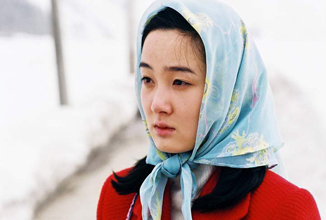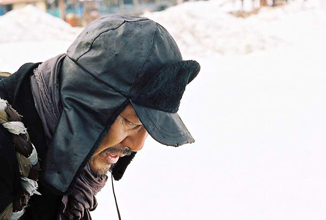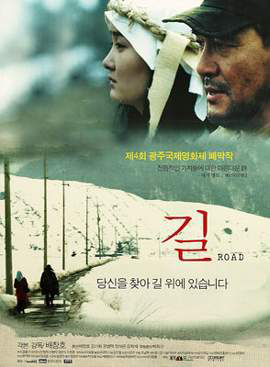Synopsis:
Tae-suk (Bae Chang-ho) is a blacksmith who goes from market to market selling his traditionally made wares and scraping together a living as best he can. While travelling to Galdam by bus, a mistaken accusation of money having been stolen results in police interviewing both him and a young girl, Shin-young (Kang Gi-hwa); the bus continuing on its journey without them.
Having no alternative means of getting to their respective destinations - Tae-suk to the market; Shin-young to her father's funeral - and fearing that Shin-young won't be safe travelling alone, Tae-suk convinces her to walk part of the way with him but as she begins to tell him the story of her life, as a way to pass the time, he soon realises that her painful tale is indirectly linked to both his estrangement from his wife and his betrayal by his best friend, Duk-soo (Kwon Beom-taek), many years before...
Review:
A scene in the very early stages of The Road in which Tae-suk has an altercation with a random man at his market stall - the man berating Tae-suk for continuing to craft blades using fire, an anvil and hard graft rather than accepting that mass production is quicker, easier and yields more consistent results - not only shows this traditionalist man's utter refusal to embrace the modernisation of the world around him but also sets out, by implication, his overall attitude to life and his deep-rooted distrust of change in any form, and no sooner do we see - shortly afterwards - his reaction to the news that his estranged wife has been trying to contact him than the underlying reality of his aversion to moving forward begins to show.
For Tae-suk is emotionally stranded in the past; imprisoned in a never ending vicious circle of pain relating to, and caused by, the things that drove him to separate from his wife and feel betrayed by his best friend.
Similarly, Shin-young has been unable to put the pain of her past behind her to the extent that the emotional stress she feels even affects her physically - on numerous occasions and without warning - and though both she and Tae-suk initially think their 'road trip' together is simply and only that, the discovery of their indirect link to each other (i.e.: the mutual cause of their separate pain) is soon to instead send them on an emotional, cathartic and ultimately uplifting journey through the trials and tribulations of their individual lives so far.
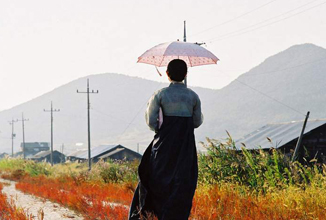 |
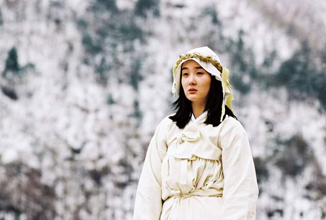 |
Narrative elements of past pain, separation, love, loss and seemingly insurmountable barriers wrapped within overarching cathartic journeys of the body, mind and/or soul are inherent to any number of Korean films and, for as long as you care to mention, critics (including myself, in several instances) have waxed lyrically on the supposedly inferred connection of these ideas to the tumultuous history of Korea itself. However, whether or not you give credence to such assumed associations (in some or even any cases) the fact of the matter remains: Their appearance together brings the subconscious feeling of watching a 'classic' Korean film to those familiar with their combined use in the storylines of seminal Korean cinematic works.
In the case of The Road, this is added to further by the "present day" story being set in the 70s and, combined with flashback sequences stepping back to the mid-to-late 50s, results in The Road appearing a lot older (and, once again, more classic) than might otherwise have been the case.
Of course, veteran director Bae Chang-ho is no stranger to classic Korean cinema: The Road was his 17th film (which he also wrote and starred in) and this type of 'road movie' narrative is far more his forte than, for example, his previous 2001 foray into the action/drama genre with the far less favourably received The Last Witness. Bae Chang-ho was the most successful Korean film director of the 80s and he used that acclaim to allow him to subsequently focus on lower budget films with largely more gentle and (fairly) straightforward storylines. The Road is clearly a return to films of that ilk and is, without question, all the stronger for it, and while it could be said that the early narrative references and clear pointers towards the past of main character Tae-suk make figuring out the majority of the true state of play fairly easy that isn't, in fact, cause for criticism in any way, shape or form. In short, ultimately the cathartic journey undertaken in The Road is equally as important as the reasons that made that journey necessary in the first place.
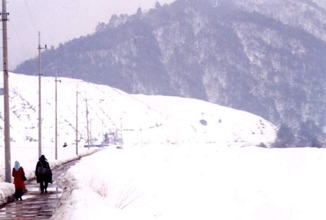 |
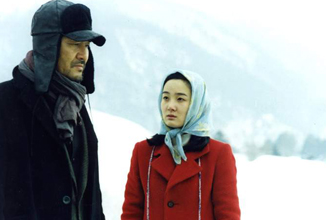 |
Visually, The Road is stunning. Though it is, as already stated, a low budget work, the use of gorgeous vistas as an integral (yet understated) part of scenes gives a feeling of sumptuousness throughout; whether showing the beauty of the Korean countryside or accenting the harshness of the Korean winter. A beautiful musical soundtrack consisting of gently played acoustic instruments and traditional songs sung acapella accent the beauty of the visuals yet further and round things off to a tee.
Several years after The Road, Bae Chang-ho was called upon to make a film highlighting the beauty of Jeju Island in a collaboration between the Korean Culture Ministry and Arirang TV. The Trip (2010) was the result and it is highly likely that director Bae's deftness at detailing visual beauty within 'road movie' narratives - such as The Road and Whale Hunting - was a large part of the reason he was asked to be part of the project.
You can read the Hangul Celluloid review of The Trip at: http://www.hangulcelluloid.com/thetrip.html
Cast:
Bae Chang-ho, Kang Gi-hwa, Kwon Beom-taek
Summary:
Initially appearing to be a trip on foot to a specific geographical destination, The Road quickly shows itself to be far more a journey of the heart, mind and soul in search of an inner place of peace.
Postscript: The Road was originally made in 2004 and though it was screened at several international film festivals a full release in Korean cinemas (with English subtitles) was held back until November 2006; hence that year being used in the banner description at the top of this review.
DVD
The DVD edition reviewed here is the Korean (Region 3) Sponge single disc version. The film itself is provided as a 4:3 letterboxed transfer with an image aspect ratio of 1.85:1. Despite being a low buget film and release, the image quality is exemplary throughout with no image artifacts (and no ghosting) present.
The original Korean language soundtrack is provided as Dolby Digital 2.0 and is well balanced throughout.
Excellent subtitles are provided throughout the main feature but English-speaking viewers should note that, as with many Korean DVD releases, there are no subtitles available on the DVD extras.
DVD Details:
- ‘The Road’
- Director: Bae Chang-ho
- Language: Korean
- Subtitles: English, Korean
- Country: South Korea
- Picture Format: NTSC
- Disc Format: DVD (One Disc)
- Region Code: 3
- Rating: 12
- Publisher: Sponge
DVD Extras:
- Trailer
|








